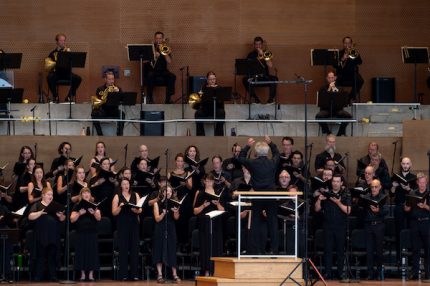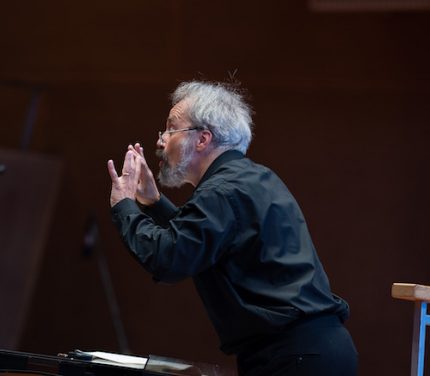Grant Park Chorus program reflects on the loss and hope of a pandemic year

The Grant Park Chorus took the spotlight Wednesday night at the Pritzker Pavilion for a trio of varied works, all of which were being heard in their lakefront festival premiere.
Though it went unmentioned in the program notes or by conductor Carlos Kalmar in his loquacious commentary, the program’s theme seemed like a reflection on the past 16 months of the pandemic with an emphasis on loss, the passing of things and spiritual solace.
Christopher Bell’s chorus was positioned on the stage of the pavilion and, mercifully, allowed to perform sans masks for the first time this summer. The winds and brass for this string-less program took the singers’ usual spot in the choral risers.
There are few more tragic what-if’s in 20th century music than that of Lili Boulanger. A brilliant prodigy, the younger sister of famed pedagogue Nadia Boulanger, Lili was one of France’s most promising composers and the first woman to win the Prix de Rome, at age 19. She suffered from ill health throughout her short life and died at age 24, her vast potential largely unfulfilled.
The handful of works Boulanger completed show an original and confident voice, not least her Psalm 24. Though the familiar text is a hymn of praise, Boulanger’s setting for four-part chorus, brass, harp and organ is idiosyncratic, even audacious. Written in 1916, it’s hard not to feel that her response to the text is less one of piety than anger and defiance at the carnage of the First World War—painted in aggressive, almost primitive blasts of brass, and dissonant harmonies in the declamatory vocal writing. Kalmar led a powerful reading with punchy brass playing while underlining the contrast of the more gentle middle section and affirmative coda. The French text could have been clearer at times but the chorus sang with polished ensemble and forceful vocalism in this four-minute gem.

Jonathan Dove is enjoying an increasingly high profile. His 1998 opera Flight has been widely performed and will be presented at both Utah Opera and Dallas Opera in the 2021-22 season.
Dove’s The Passing of the Year (2000) draws on an array of poetry in seven concise sections. While outwardly it is a paean to nature and the changing of the seasons, the choral song-cycle—dedicated to the British composer’s late mother—is also reflective of the human journey from birth to passing and life after death.
Throughout this 18-minute work, Dove demonstrates striking skill, wielding an array of offbeat vocal effects and employing inventive devices to imaginatively paint the text. Voices enter separately (the men muttering) in “The narrow bud” (Blake), followed by a whimsical quicksilver setting of “Answer July” (Dickinson), and long, enervated lines depicting the lyrical languor of “Hot sun, cool fire” (Peele).
The spacious penultimate section, “Adieu! Farewell earth’s bliss” (Nashe) is especially artful. The dirge-like opening segues into admonition (“Rich men, trust not wealth”), stark reality (“I am sick, I must die”) and eventual acceptance. The canonic writing and homophonic richness of the joyful finale “Ring out, wild bells” (Tennyson) conveys a sense of anticipatory exaltation in life after death.
Well prepared by Bell, the Grant Park Chorus members delivered first-class advocacy for Dove’s music, tackling all of the myriad challenges with clarity, expressive poise and dedication. Kalmar led a focused and well-balanced reading, and the virtuosic playing of pianist Kuang-Hao Huang (unnamed in the program) made the lack of larger forces irrelevant.
Intriguing as the first two works were, from the opening bars of the Kyrie eleison of Bruckner’s Mass No. 2 in E minor, it was clear we were now hearing the music of a master.
The second of Bruckner’s three mass settings is an outlier in his output. Written for chorus and an orchestra of brass and winds, the Mass in E minor draws its inspiration from ancient models, both Gregorian chant and the Renaissance polyphony of Palestrina. Yet the inspiration is melded into Bruckner’s usual rich Late Romantic style, resulting in a glorious when-worlds-collide confection.
Kalmar led a flowing, highly focused performance that conveyed the ingenuity of Bruckner’s score, both the vocal writing and quirky wind parts—the latter even evoking a rustic Austrian village band in the Gloria. Still, while the score of the mass was compellingly directed, less consistently manifest was its glowing spirituality, which is really the essence of the piece.
Apart from some male voices’ jarring sibilants in the Sanctus, the chorus was at their finest in Bruckner’s setting—the sopranos ethereal and pure of tone, all sections flexible, expressive and well-blended. Especially impressive was the corporate vocalism in the operatic pages of the Gloria and the cumulative buildup in the expansive Credo to a resounding Amen.
Eun Sun Kim conducts the Grant Park Orchestra 6:30 p.m. Friday and Saturday in Dvořák’s Symphony No. 9, Texu Kim’s Blow, Fly, Pop!! and Shostakovich’s Piano Concerto No. 1 with Natasha Paremski as soloist. gpmf.org
Posted in Performances




